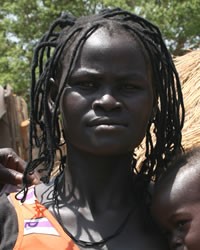Bongo in South Sudan

Photo Source:
Anonymous
|
Send Joshua Project a map of this people group.
|
| People Name: | Bongo |
| Country: | South Sudan |
| 10/40 Window: | No |
| Population: | 21,000 |
| World Population: | 21,000 |
| Primary Language: | Bongo |
| Primary Religion: | Ethnic Religions |
| Christian Adherents: | 45.00 % |
| Evangelicals: | 7.00 % |
| Scripture: | Portions |
| Ministry Resources: | No |
| Jesus Film: | Yes |
| Audio Recordings: | Yes |
| People Cluster: | Sudanic |
| Affinity Bloc: | Sub-Saharan Peoples |
| Progress Level: |
|
Introduction / History
The Bongo people are a Central Sudanic-speaking ethnic group residing in Western Bahr el Ghazal, South Sudan, and parts of northwestern Uganda. They speak the Bongo language, part of the Bongo-Baka language family, which is related to several other regional languages but not mutually intelligible with them.Historically, the Bongo were a large and influential group, with estimates suggesting a population of 300,000 before the mid-19th century. Their numbers were drastically reduced due to slave raids, Mahdist invasions, and later colonial disruptions. Bongos were known for their iron smelting and wood carving, particularly their funerary sculptures, which have been collected and displayed in museums across Europe.
What Are Their Lives Like?
The Bongo live in small, scattered settlements, primarily in Tonj District and near Wau. They are subsistence farmers, cultivating crops such as sorghum, tobacco, sesame, and durra. They also engage in hunting, fishing, and crafts like basket weaving, ironwork, and wood carving.Their traditional clothing and ornaments reflect a rich cultural heritage. Men once wore iron rings as armor, and women adorned themselves with lip disks and nose rings. Today, cotton garments are more common. Social life is organized around village chiefs, who hold influence through wealth and magical knowledge rather than formal authority.
What Are Their Beliefs?
The Bongo practice a mix of ethnic religions, Protestant Christianity, and Islam. Traditional beliefs include witchcraft, sorcery, and ancestor veneration. The Bongo are known to have adopted a powerful form of witchcraft called mapiang from the Dinka, which spread widely across the region.
What Are Their Needs?
Although some Bongo identify as Christians, many still practice traditional religions. There is a need for discipleship, Bible translation, and church planting.The Bongo rely on subsistence farming and crafts. Access to markets, tools, and training could improve livelihoods. Remote living conditions limit access to basic services. Infrastructure development is essential to improve the quality of life.
Prayer Points
Pray for the spiritual awakening of the Bongo people and for the gospel to take deep roots in their communities.Ask God to raise up local leaders and missionaries to disciple and teach the Bongos to take Christ to others.Pray for the preservation of their language and cultural identity, especially among younger generations.Intercede for economic opportunities and sustainable development in Bongo villages.Pray for peace and protection from conflict and displacement.